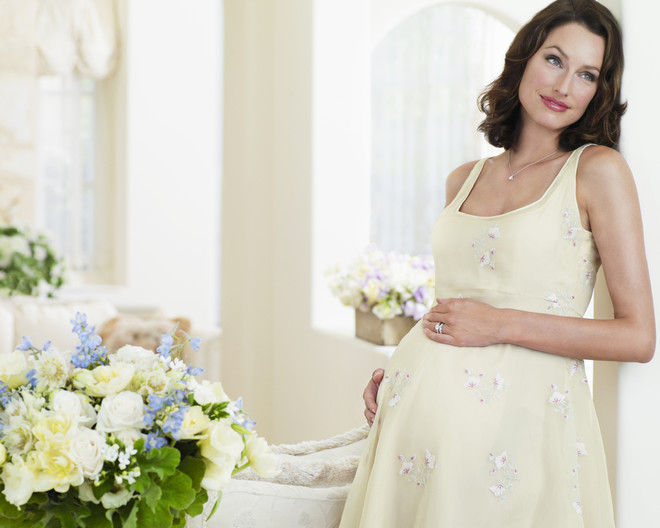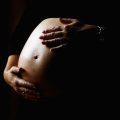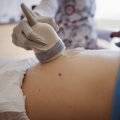 In general, there are very few healthy women today,so the concept of the best age for pregnancy "spreads". Today, a 30-year-old woman, who has followed her years well, may be healthier than the 18-year-old who has been drinking and smoking since the age of 14. But in general, it is more dangerous to give birth or too soon, to 17-18 years, or very late, after 50. So, what to expect from pregnancy and childbirth at different ages? Early pregnancies are dangerous because a young girl is neither physiologically nor psychologically ready for such a load on the body. If the formation of the organism, and especially its reproductive system, is not yet complete, then too early pregnancy can end about the same as after 50 - all sorts of complications on the body, early miscarriages, premature or traumatic births. Moreover, too early pregnancy, most likely, is not planned, which definitely imposes its imprints not only on its outcome, but in general on the further education of the child by a very young mother. A pregnancy and childbirth after 40 years are complicated by the fact that the body's reserves are beginning to be depleted, not only reproductive. After all, many systems of organs participate in pregnancy.
In general, there are very few healthy women today,so the concept of the best age for pregnancy "spreads". Today, a 30-year-old woman, who has followed her years well, may be healthier than the 18-year-old who has been drinking and smoking since the age of 14. But in general, it is more dangerous to give birth or too soon, to 17-18 years, or very late, after 50. So, what to expect from pregnancy and childbirth at different ages? Early pregnancies are dangerous because a young girl is neither physiologically nor psychologically ready for such a load on the body. If the formation of the organism, and especially its reproductive system, is not yet complete, then too early pregnancy can end about the same as after 50 - all sorts of complications on the body, early miscarriages, premature or traumatic births. Moreover, too early pregnancy, most likely, is not planned, which definitely imposes its imprints not only on its outcome, but in general on the further education of the child by a very young mother. A pregnancy and childbirth after 40 years are complicated by the fact that the body's reserves are beginning to be depleted, not only reproductive. After all, many systems of organs participate in pregnancy. Photo: GettyImages
Photo: GettyImages I, as the "Fruit Advocate", believe that the best period for the birth of the firstborn, both physiologically and psychologically, is from 20-25 to 30-35 years.
I, as the "Fruit Advocate", believe that the best period for the birth of the firstborn, both physiologically and psychologically, is from 20-25 to 30-35 years.
From 18 to 25 years old
This period is considered ideal forpregnancy and childbirth from the point of view of the body's condition. It is likely that at this age, a woman has a stable hormonal background, a good ovarian reserve, chronic diseases have not yet had time to attack the body, a lot of strength and energy. What is especially important? The eggs with which the girl was born are still "fresh", environmental factors, lifestyle, infectious diseases, chronic diseases, natural aging have not yet had time to affect them. Accordingly, the risk of giving birth to a child with any pathology is minimal. Childbirth at this age, most likely, should also go well. Another thing is that today, at 18-25 years old, women are allare more busy with getting an education, building a career, arranging their own lives – and the birth of their first child is less and less often planned at 18-25 years of age.
Another thing is that today, at 18-25 years old, women are allare more busy with getting an education, building a career, arranging their own lives – and the birth of their first child is less and less often planned at 18-25 years of age.
From 25 to 35 years old
The concept of "old mother" is a thing of the past.Today, the average age at which a woman gives birth to her first child has shifted to the range of 25-30 years, or even 30-35. A woman's fertility up to 35 years is still quite high. Another thing is that at 30-35 years, it is still better to seriously plan a pregnancy, having checked your health. There may be infectious diseases that a woman may not even know about, chronic diseases, including gynecological ones. Lifestyle by 30-35 years also begins to affect the body. But it is much easier to improve the situation before 35 years than later! Pregnant and give birth to a healthy childindependently without involving methods of assisted reproductive technologies - ART - only slightly patching up the body, during this period is still easy. Yes, and parenthood from 25 to 30 years is often already desired, mature and conscious.
Pregnant and give birth to a healthy childindependently without involving methods of assisted reproductive technologies - ART - only slightly patching up the body, during this period is still easy. Yes, and parenthood from 25 to 30 years is often already desired, mature and conscious.
From 35 to 40 years old
By the age of 40, the previous lifestyle has greatlyaffects the condition of the body. In general, a woman's fertility decreases during this period, but at this age, the successful outcome of pregnancy and normal childbirth will be greatly influenced by the individual characteristics of the body. If a woman has been involved in sports, ate right, did not smoke, did not wear out her body with constant stress, and is not overweight, then she has a much lower chance of getting "surprises" from the body during pregnancy in the form of exacerbations of various diseases. But in general, during pregnancy at this age, the risk of developing, for example, hypertension and diabetes mellitus increases significantly. But there are indications for cesarean section related toage, of course not. Caesarean sections are performed exclusively for indications related to the state of the body. Another thing is that by the age of 40 the number of such indications objectively increases, so the percentage of Caesarean sections at this age can also increase.
But there are indications for cesarean section related toage, of course not. Caesarean sections are performed exclusively for indications related to the state of the body. Another thing is that by the age of 40 the number of such indications objectively increases, so the percentage of Caesarean sections at this age can also increase.
After 40 years
Today, no one gives birth to their first child after 40you will be surprised. All thanks to ART and modern medicine. Yes, the risks of having children with pathologies, miscarriages and complications increase significantly, but becoming a mother after 40 is the norm today. And the percentage of successful pregnancies and births at this age is high. Nevertheless, it should be taken into account that after 40 years, the "biography" of a woman's reproductive organs can already be volumes. Any treated or untreated inflammatory, infectious diseases, interrupted pregnancies affect the condition of the internal genital organs and, as a result, the bearing of a child and the process of childbirth. Due to changes in the tissues of the reproductive organs and decreased muscle elasticity, childbirth can be more difficult and traumatic. Postpartum recovery can be long. It is also worth considering the fact that the child's father,most likely, he is also no longer a young guy and has his own history of health problems. But it is possible to reduce the risk of having a child with developmental abnormalities after 40 with the help of prenatal screening, IVF and other modern diagnostic procedures.
It is also worth considering the fact that the child's father,most likely, he is also no longer a young guy and has his own history of health problems. But it is possible to reduce the risk of having a child with developmental abnormalities after 40 with the help of prenatal screening, IVF and other modern diagnostic procedures.









